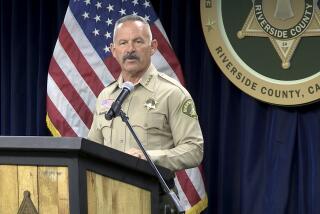Latinos and Deputies Aren’t Doomed to Tension and Excess : Police: Riverside County once had deputies who were respected by Chicanos; who’s to say that can’t be the case today?
- Share via
It’s all too easy for police abuse watchdogs to fault the Riverside County Sheriff’s Department in the aftermath of the videotaped beating of two illegal immigrants by a pair of deputies--especially in Los Angeles’ Latino community, where resentment over historic cases of police misconduct has been augmented by anger over verbal immigrant-bashing by politicians.
But critics eager to lump this incident in with the 1991 beating of Rodney King by Los Angeles police officers don’t know the Riverside Sheriff’s Department that this L.A.-bred Chicano came to know while working as a reporter for The Times and, earlier, the Riverside Press-Enterprise.
Until recently, the most noteworthy thing about Riverside’s deputies was how well they generally got along with Latinos in the many rural communities they patrol in a giant county that sprawls from L.A.’s eastern suburbs to the Arizona border, almost 200 miles away. News reports in the aftermath of Monday’s incident suggest that, to Latinos in Riverside, that once-sterling image has been tarnished in recent years. But when I first got to Riverside in 1969, the contrast from Los Angeles was palpable.
I was expecting the tension that underlay police-community relations in my hometown--not just in the city itself, but in the unincorporated areas like East Los Angeles that are patrolled by Los Angeles County sheriff’s deputies. In 1970, those tensions would explode into major riots. But in Riverside I was immediately struck by how Latino activists gave deputies credit for doing their job fairly.
This was at a time when Latino activists were venting anger over years of perceived abuse by police--not just modern cops like LAPD’s, but historic boogeymen like the Texas Rangers. To hear a Chicano say anything nice about cops was rare.
At first, I cynically assumed that the sheriff’s deputies looked good in comparison to the Riverside police, whose reputation in the Casa Blanca barrio was akin to the LAPD’s on the Eastside.
But then I met Lt. Paul Yoxsimer.
An Indio native who joined the Sheriff’s Department in 1966, Yoxsimer was a key player during one of the toughest situations I ever covered as a reporter, the 1973 grape strike in the Coachella Valley. It was called by the United Farm Workers union to protest sweetheart contracts between local ranchers and the Teamsters union, and was marked by repeated clashes between UFW pickets, Teamster goons and farm security guards. Often caught in the middle, trying to be evenhanded, were deputies from the Indio substation under Yoxsimer’s command.
They kept the peace. Later on in that year-long dispute, in other counties, UFW members would die in strike-related confrontations. But no one was ever seriously hurt in Riverside County. And for that, everyone gave credit to Yoxsimer and his men.
No less a Chicano hero--and knowledgeable critic of rural sheriff’s departments--than the late UFW leader Cesar Chavez once told me that Yoxsimer was “the fairest cop we ever dealt with.”
That was after Yoxsimer died suddenly of a brain hemorrhage in early 1974 at the age of 31. Not only did hundreds of uniformed police officers show up at his funeral, but so did UFW members bearing the same red-and-black union flags they carried on picket lines. It was the most profound sign of respect Chavez could show anyone.
Clearly, Yoxsimer was a different breed of cop. And he convinced me that the police agency he worked with was different, too--at least to the degree that it tolerated an introspective young lieutenant who composed classical music in his spare time.
I asked him once why his officers got along with minorities at a time when barrio residents referred to cops as “pigs” or worse. His answer was characteristically candid.
“This is a big county,” he reminded me. “Most of my people ride alone in their patrol cars. Even a tough cop tends to be a bit more diplomatic when his backup is far away.”
That pragmatic wisdom has come back to me a lot lately--after the King beating and the 1992 riots that followed, and when I saw the videotape of Monday’s incident. I can only speculate what Yoxsimer, had he lived, would have made of it.
He was fair, so he’d probably argue that the deputies deserve some understanding--an adrenaline rush after a high-speed chase may have clouded their judgment. And he was compassionate, so I expect he’d have sympathy for the beaten immigrants. He’d also be proud of the openness and candor with which Riverside County officials are handling this case. He might even cite that as reason to hope that any lessons learned from this travesty could keep something similar from happening again.
And because of Yoxsimer’s reputation, I’d probably give his department the benefit of the doubt.
That’s what Riverside’s Latino community needs to do now. A lot of things can change in 20 years, of course. Maybe they have--and not for the better--in both the city and county police forces. But any agency, any community, with a history of good cops like Paul Yoxsimer to call on has reason to hope things can be made better again.
More to Read
Sign up for Essential California
The most important California stories and recommendations in your inbox every morning.
You may occasionally receive promotional content from the Los Angeles Times.













